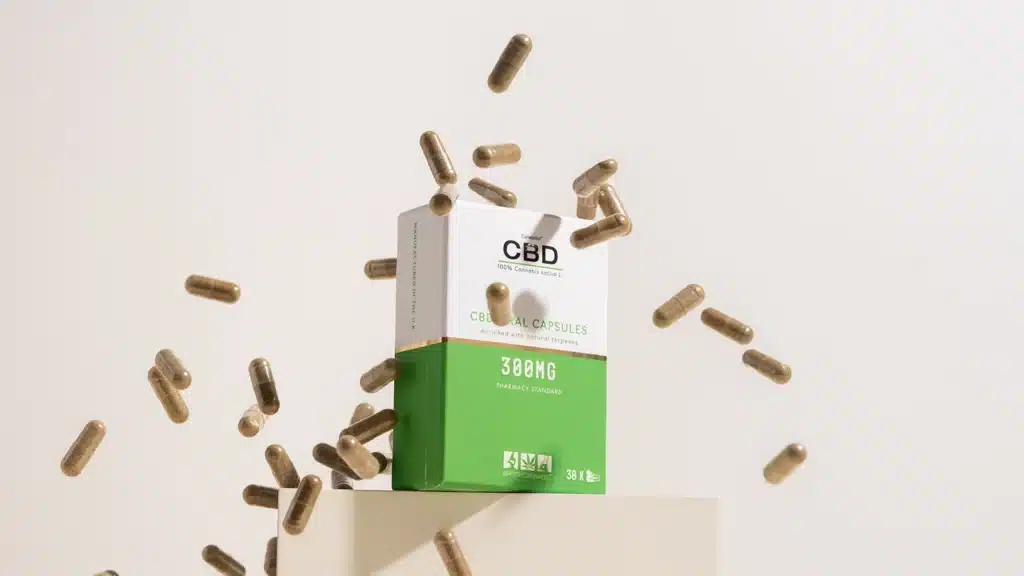CBD, known scientifically as cannabidiol, has swiftly risen as a standout in alternative wellness and health discussions. Originating from the cannabis plant, this non-psychoactive compound has demonstrated its potential in providing therapeutic effects for various conditions.
From being an anxiolytic to offering pain relief for certain ailments, it has captivated the attention of both researchers and consumers alike.
Over the years, numerous delivery methods for CBD have been developed to cater to individual preferences and needs. Tinctures, vapes, topicals, and edibles are some popular choices.
Among these, CBD tablets have garnered significant attention. Their discrete nature, standardized dosage, and convenience make them a preferred choice for many, especially those new to the world of CBD or those seeking a no-fuss consumption method.
CBD Tablets And Other Medications
However, while the allure of CBD is undeniable, it’s pivotal to remember that it, like any substance introduced to our system, has the potential to affect and be affected by other compounds.
This phenomenon isn’t unique to CBD; many natural supplements and medications can interact in our bodies in ways that amplify, diminish, or otherwise modify their intended effects.
The emphasis, thus, should be on informed consumption. Particularly for individuals on other medications, understanding how CBD might interact with those drugs is crucial.
The beauty of CBD might be in its therapeutic potential, but it’s only when consumed responsibly that one can genuinely benefit without unexpected setbacks.
To give you a bird’s eye view of what this article covers:
- An introduction to CBD tablets and their advantages.
- Detailed insights on CBD’s interactions with other medications.
- Legal considerations of CBD tablets in the UK.
- Tips on choosing the right CBD UK product tailored to individual needs.
- A reflection on the safety profile of CBD based on current research.
What are CBD Tablets?
CBD tablets, at their core, represent a culmination of technological advancements in the world of alternative wellness. These tablets are reminiscent of their close relatives, CBD capsules.
However, unlike the latter which often come enclosed in a gelatin or vegetarian outer layer, tablets are pressed and compacted into a solid form. They house CBD oil, ensuring that users get a precise and predetermined dose of CBD every single time.
One of the distinct advantages of these tablets is their neutral sensory profile. Anyone who has tried raw or unflavored CBD oil can attest to its earthy and sometimes bitter taste.
This flavour can be off-putting for some, creating a barrier to consistent usage. CBD tablets sidestep this issue entirely.
By offering an efficient, tasteless, and odourless method of consumption, they ensure that even the most palate-sensitive individuals can benefit from CBD without a second thought about its taste or aroma.
Beyond their user-friendly nature, the surge in their popularity can be attributed to the profound benefits associated with CBD. Preliminary research and anecdotal reports have shed light on CBD’s potential in managing a spectrum of conditions.
From soothing anxiety and reducing pain to mitigating certain sleep disturbances, the compound’s therapeutic promise is vast. The latter has sparked interest in those plagued by sleepless nights, leading to discussions about the efficacy of taking CBD tablets before bed to usher in a restful night’s sleep.
The thought of a peaceful night lessened pain, or a day without overwhelming anxiety is undoubtedly enticing. The holistic appeal of CBD, coupled with its non-psychoactive nature, makes it a compelling option for many.
However, it’s not a magic bullet, and its interaction within the complex system of our body isn’t isolated. This brings to light an essential consideration.
While the therapeutic horizon of CBD appears promising, it’s not devoid of considerations. A paramount one is its interaction with other medications.
Just like how certain foods might influence the effect of drugs (think grapefruit and certain medications), CBD, too, can have an interplay with other substances in our body. It’s this interplay, if unchecked, that can modify the effects of either substance, warranting due diligence before simultaneous consumption.

Interactions Between CBD and Other Medications
One crucial thing to remember is that the body processes CBD, like many other drugs, in the liver. Some medications can affect how the liver metabolizes substances, and in turn, CBD can influence how the liver processes certain drugs. Here are some of the known interactions:
- Blood Thinners: Combining CBD with blood thinners can amplify the effects of the medication. In essence, CBD can increase the levels of the drug in your bloodstream. This could potentially lead to bleeding risks. If you’re on drugs like Warfarin, it’s essential to be cautious when introducing CBD capsules or tablets.
- Immunosuppressants: Individuals on immunosuppressive drugs should also be wary. The interaction between CBD and these medications is not yet entirely understood. However, the list of drugs that might not be taken with CBD includes immunosuppressants, indicating a potential risk.
- Antidepressants: The interplay between CBD and certain antidepressants is another area of interest. While CBD has shown potential in managing depressive symptoms, its interaction with other antidepressant drugs needs further research.
For a comprehensive overview of the interactions between CBD oil and other medications, it’s always best to consult with a healthcare professional.
Legal Aspects of CBD Tablets in the UK
When considering the introduction of CBD into your regimen, it’s also essential to be aware of the legalities. In the UK, CBD tablets are legal if they adhere to specific regulations, notably concerning THC content and proper labelling.
To be legal to buy and sell, CBD products in the UK must contain less than 0.2% THC.
Choosing the Right CBD Product
With a plethora of options available, how do you pick the right CBD product? If you’re torn between CBD tablets and gummies, consider factors like dosage control, the onset of effects, and taste.
Tablets often allow for more precise dosing and can be taken discreetly. When buying CBD tablets, it’s also crucial to look at aspects like dose, ingredients, third-party testing, and pricing.

Safety of CBD
The increasing global attention on cannabidiol (CBD) has precipitated questions regarding its safety. As the world grapples with myriad health challenges, from chronic pain to mental health issues, the quest for effective yet safe solutions remains paramount.
This makes the safety profile of CBD, as an emerging alternative, a topic of keen interest.
Current research broadly paints CBD in a favourable light when it comes to safety. Most people who consume CBD report little to no side effects, showcasing its general tolerability.
The side effects that are occasionally reported, such as drowsiness or dry mouth, are typically mild and transient. Drowsiness, for instance, might be a concern for those operating heavy machinery or driving, but it might be a welcomed effect for someone struggling with insomnia.
Likewise, a dry mouth, while inconvenient, is generally not considered severe and can be easily managed.
However, as with any evolving field of study, there are nuances to be understood. The keyword is “current” in “current research.”
While the present understanding of CBD is rooted in its short-term effects and immediate interactions, the long-term implications remain less charted. Considering that many individuals might be looking at CBD as a prolonged solution for their health concerns, understanding these long-term effects becomes crucial.
It underscores the need for ongoing research, continuous monitoring, and cautious optimism as we continue to unlock the myriad mysteries of this fascinating compound.
Conclusion
In summary, while CBD tablets offer potential benefits, it’s imperative to approach their use with caution, especially when taken alongside other medications. Always consult with a healthcare professional when considering adding CBD to your routine and ensure you’re purchasing from reputable sources that comply with UK regulations.
Incorporating CBD might be a game-changer for many. Still, as with all things, it’s essential to prioritize safety and make well-informed decisions. Whether you’re considering CBD capsules or tablets, knowledge and consultation are your best allies.




